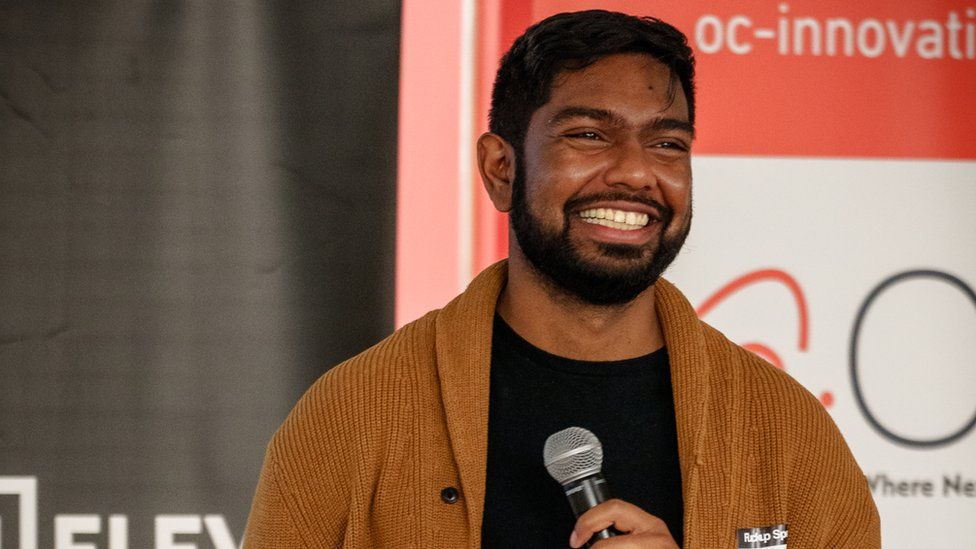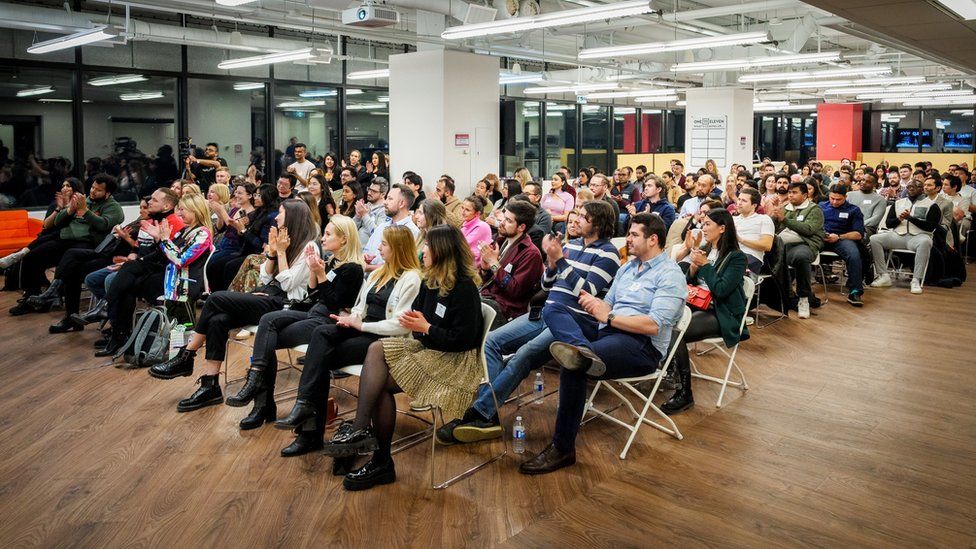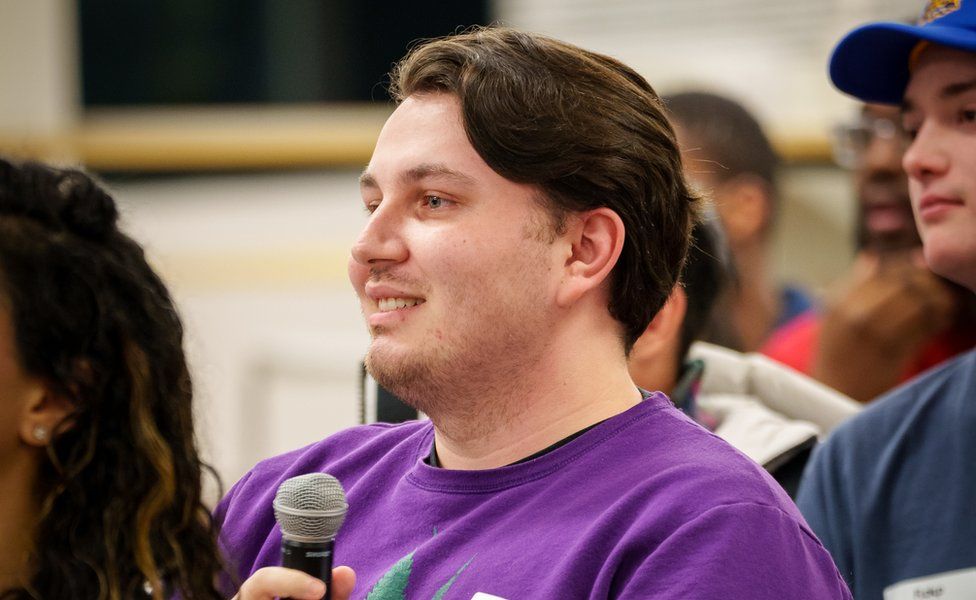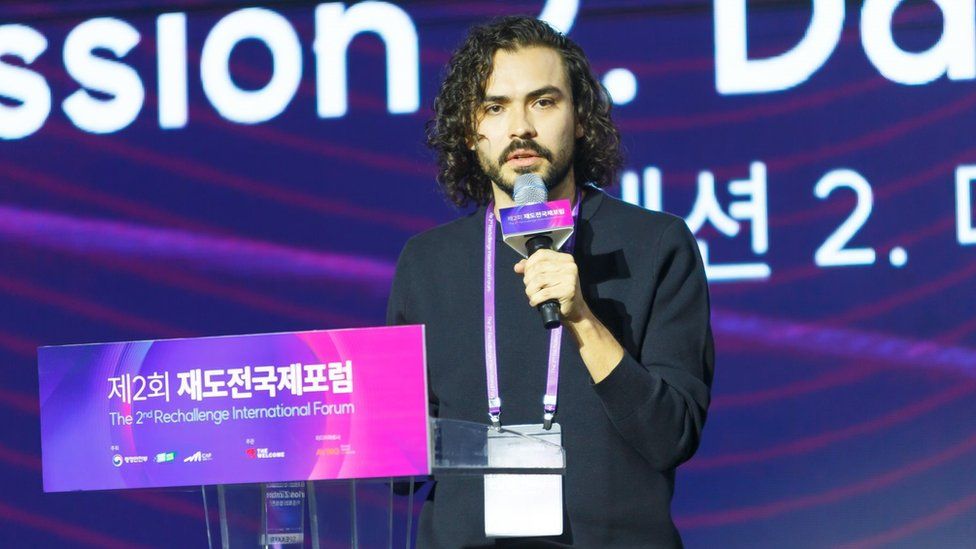The entrepreneurs celebrating their past failures

Success in business is rightfully acclaimed, but should failure also be celebrated?
When Vithushan Namasivayasivam was previously working as a software engineer for one of the main global music streamers he made a huge mistake.
It was the kind of error that you wouldn’t typically wish to share with a room brimming with strangers. But Mr Namasivayasivam recently divulged his blunder to dozens of people at an event in Toronto, Canada.
His mistake seven years ago involved his work trying to ensure that when bands and solo artists submitted 10-second long, looping videos to accompany their songs, they would play smoothly on people’s mobile phones.
At the time the videos were being trialled in Canada.
They should have been streamed to users’ handsets just the one time, but due to Mr Namasivayasivam’s error they were constantly re-downloaded onto people’s phones every 10 seconds.
For those not connected to wi-fi, it quickly used up all their data.
Mr Namasivayasivam only became aware of the mistake when he read complaints on an online forum. One person had written that it had “killed his data”.
Another said: “I hate this feature so much. Whoever came up with this, should be fired and shot.”

While most of us might have wanted to keep such memories locked away, Mr Namasivayasivam revealed all into a microphone while standing on a stage in front of room full of strangers.
The gathering was part of a global movement, with more than 250 cities now participating in public showcases of how entrepreneurs and other business leaders, mainly in the tech space, fail and then recover from their gaffes.
The idea is that it is cathartic to talk about such things, and everyone in attendance can learn from the mistakes, and ask questions.
Mr Namasivayasivam told the crowd in Toronto: “It was at this moment that I messed up, and this is where the feelings of imposter syndrome and anxiety and shame came flooding in.”
He was one of three speakers at the event. Afterwards he told the BBC that it felt good to share his face-palm moment, “and how someone can bounce back from that embarrassment”.
Today Mr Namasivayasivam is the founder and chief executive of Skillify, a Toronto-based provider of software coding training.
Bill Murray (not the famous actor), works for Canadian software firm Padiem, which makes systems that enable firms to handle timesheets and wages.
He was in the audience watching Mr Namasivayasivam, and says that the story particularly resonated with him.

“If you’ve never made any mistakes as a coder, you probably weren’t innovating enough,” says Mr Murray.
“Most people want to hide their embarrassing moments or failures, but because the speakers open the floor with some of their toughest moments, it sets the stage for everyone attending to let their guard down and really get to know one another.”
Tech entrepreneurs shouldn’t only celebrate their wins, Mr Murray adds. “When you study someone’s success, it’s almost like asking them what lottery numbers they played to win.
“Of course you can learn lots from successful people, but to me the concept of openly talking about your failures felt like there was much more to learn from.”
Marsha Druker, who organises the regular failure talks in Toronto, says she looks for speakers willing to not just be open about their professional failure story.
Instead she also wants them “to tell audiences about what they learned about that mistake, now that they have had time to reflect on it”.
She says a common theme to what tech entrepreneurs face when they fail is “a story of resilience and coming out at the other side, and recognising that failure shouldn’t be a taboo topic we don’t talk about openly”.
Venturing into that often off-limits topic is the reason why such celebrations of failure began in Mexico City in 2012, says Carlos Zimbrón, a Mexican tech entrepreneur who first came up with the idea for the evenings.
During a barbeque at home with other friends, Mr Zimbrón says he expressed how boring it was to attend “typical conference with keynote speakers talking about their successes, and how it was rare to hear the B-side of that story”.
Soon after, he and his friends held the first failure talk in the same backyard space.

As word spread about the Mexico City event, other entrepreneurs in cities in 80 countries around the world have since started their own parallel nights. They hold monthly talks, coupled with a Q&A session after each speaker.
Mr Zimbron says that the talks, many of which are later uploaded to YouTube, “can be inspiring for people who may have gone through the same problems”.
He adds: “When you can connect to someone else’s mistakes, and can see how vulnerable they are in sharing that story, that’s where you can connect with other entrepreneurs.”


New Tech Economy is a series exploring how technological innovation is set to shape the new emerging economic landscape.

Leah Edwards, is both a director at US investment fund Lighter Capital, and a lecturer on leadership and innovation at University of California, Berkeley.
She says she loves that these public talks about business failure are “normalizing the fact that something is hard, and that it takes a number of at-bats [a baseball term for a batter’s turn] in order to find the right combination of teams and market opportunity, and the right product or service”.
Ms Edwards adds Silicon Valley has long had a high tolerance for start-ups not succeeding, and that it is good to see this spreading.
“There will always be entrepreneurs whose companies don’t work out in the end, but they pick themselves back up and try again,” she says. “I’m excited to see this recognition of that kind of resilience spreading into other geographies and cultures.”
